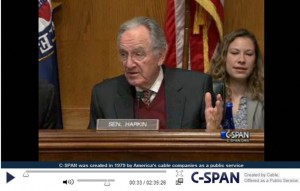Senators Debbie Stabenow (D-MI) and Roy Blunt (R-MO) yesterday introduced the Excellence in Mental Health Act (S. 264). This legislation would support the nation’s community mental health and addictions system by establishing national standards and oversight for Federally Qualified Behavioral Health Centers (FQBHCs).
The Senators were joined by cosponsors Jack Reed (D-RI), Susan Collins (R-ME), Barbara Boxer (D-CA), Marco Rubio (R-FL) and Patrick Leahy (D-VT). At a press conference to mark the introduction of the bill, several consumer and provider advocates from National Council member organizations spoke about the importance of increasing access to community behavioral health services.
Malkia Newman, Board Chair of Oakland County Community Mental Health Authority, said: “I lived over 30 years with undiagnosed Bi-Polar Disorder. But I’m proof that recovery is possible. I don’t want anyone to have to live the way that I did during those dark years, when hope and help are available. My message to Congress is: please pass this bill so that everyone can get the mental health help they need.”
Nancy Smith, mother of a daughter with a severe emotional disorder who received treatment at Community Connections in Washington DC, added, “Too many young people don’t have access to a full range of mental health services. Too many fall through the cracks after being hospitalized, like our daughter did for so many years. The Excellence in Mental Health Act will enable community mental health programs to offer a broader array of services. The fact is, these services really do change lives.”
Joining Ms. Newman and Ms. Smith at the press conference were Gallatin County Sheriff Brian Gootkin, who spoke about the burden on law enforcement of responding to calls for people with untreated mental illness, and National Council President & CEO Linda Rosenberg, who expressed the National Council’s support for this bill.
“Behavioral health has long been left out of the federal dictionary,” said Linda. “As a result, mental health and addiction providers cannot receive the critical federal funds that support other safety net providers. They share the unique responsibilities of the safety-net — but none of the protections.”
Community mental health and addiction providers struggle to meet the existing needs of vulnerable Americans because of cobbled funding streams and insufficient resources. The Excellence Act would begin to remedy this problem by providing a stable reimbursement stream for organizations that meet the standards and oversight requirements to become FQBHCs. To learn more about this legislation and see a 1-page fact sheet on the bill, visit our website http://www.thenationalcouncil.org/cs/public_policy/resources_and_issues/federally_qualified_behavioral_health_centers.
You can also check out the press coverage of this legislation from the Washington Post (http://www.washingtonpost.com/national/health-science/measure-would-strengthen-mental-health-care-system/2013/02/07/dd64db44-714d-11e2-ac36-3d8d9dcaa2e2_story.html), the New York Times (http://thecaucus.blogs.nytimes.com/2013/02/06/eyes-on-gun-violence-lawmakers-propose-expanded-mental-health-access/), and The Hill. (http://thehill.com/blogs/healthwatch/mental-health/281769-senators-film-director-unveil-mental-health-bill)
Stay tuned next week for an opportunity to write to your Senators and urge them to become cosponsors of this important legislation!
{ 0 comments }

 Are the payers you work with creating new definitions for the 2013 CPT codes? Or not accepting claims submissions with 2013 CPT codes? Both are HIPAA violations.
Are the payers you work with creating new definitions for the 2013 CPT codes? Or not accepting claims submissions with 2013 CPT codes? Both are HIPAA violations.



 In the wake of last month’s tragic shooting in Newtown, the National Council joined hundreds of our colleagues in the behavioral health field in signing on to a
In the wake of last month’s tragic shooting in Newtown, the National Council joined hundreds of our colleagues in the behavioral health field in signing on to a